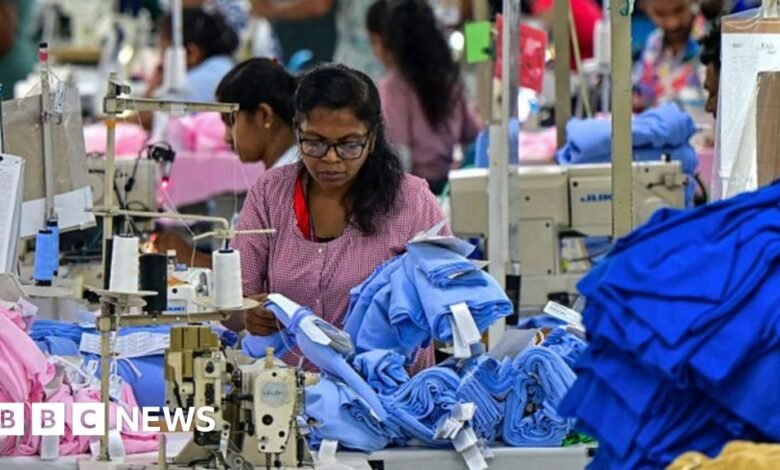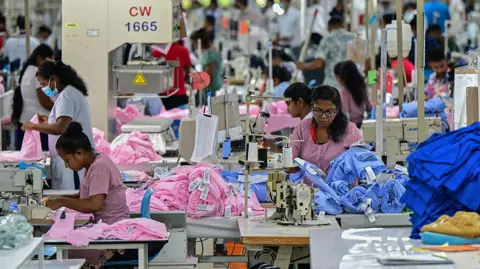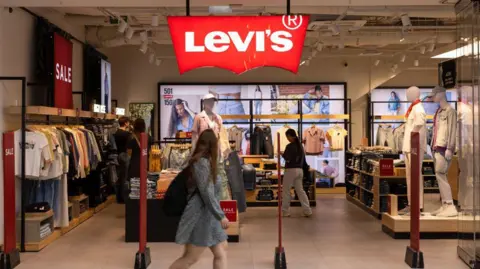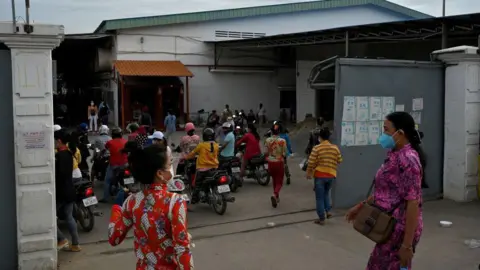They made America’s clothing. Now they are getting punished for it.

BBC Seneala
 Gety photos
Gety photosHundreds of thousands of clothes staff really dwell throughout Asia, from my palms to mouth, fearing their jobs as a deadline to conclude a industrial take care of the US – or dealing with punishment definitions – nearer.
On July 9, after a 90 -day stopping the customs tariffs of the international locations to barter, the US President knowledgeable many international locations within the new drawing zone that may begin on August 1. The brand new costs, though they’re lower than the proposed charges in April, did little nervousness to settle down.
Among the many international locations that obtained the letters of Donald Trump, clothes facilities like Cambodia and Sri Lanka, which depended enormously on the US as a export market. The messages mentioned that the 2 international locations will face a tariff of 36 % and 30 %, respectively.
Nike, Levi’s and LululeMon are among the many American manufacturers with massive names that comprise the most important a part of their garments in these international locations.
“Are you able to think about what’s going to occur if? [we] Examine our jobs? I’m very anxious, particularly for my youngsters. “They want meals.
Mrs. Suclin and her husband Cook dinner Tuk make livestock luggage for 10 hours a day. Collectively, they earn about $ 570 a month – barely sufficient to cowl the lease and supply their younger and aged fathers.
“[I want to] Ship a message to President Trump, to inform him to lift the tariff on Cambodia … We want our jobs to assist our households, “she mentioned to the BBC.
Cambodia, which has turn out to be a well-known various to Chinese language retailers because of its prepared -made provide of low wage employment, was exported by greater than $ 3 billion of garments to the US final yr, in keeping with the ASEAN Statistics Division. The sector, which employs greater than 900,000 individuals, is greater than the nation’s whole exports.
For Sri Lanka, exports to the US helped the clothes industry-which straight employs about 350,000 people-to earn $ 1.9 billion final yr, making it the third largest export of a overseas change within the nation.
“if [30%] Johann Lawrence, Secretary -Normal of the Joint Garments Discussion board in Sri Lanka, instructed Reuters that the ultimate quantity, Lanka is in bother as a result of our rivals, like Vietnam, obtained a decrease tariff. “
Current negotiations
The Sri Lankan authorities hope to barter an extra discount in definitions, however they haven’t revealed what they’re thought-about an appropriate charge.
A few of its leaders observed that the nation had obtained the best concession – from 14 proportion factors – to the extent of earlier negotiations. “That is the start of an excellent state of affairs,” mentioned Finance Minister Harshana Suriapubiroma final week.
Cambodia, which has a proportion proportion, can also be in search of to carry extra conversations. “We’re doing our greatest to guard the pursuits of traders and staff,” mentioned Deputy Prime Minister Solar Changul, who leads the negotiating group.
“We wish the tariff to be zero … however we respect their determination and we are going to proceed to attempt to negotiate a decrease charge,” he mentioned.
 Gety photos
Gety photosTrump says that customs duties are mandatory to scale back the hole between the worth of the products that the US buys from different international locations and people they promote to them.
“Our relationship was, sadly, removed from reciprocity,” the American chief wrote in letters to numerous international locations final week.
However analysts don’t agree.
Mark Annar, dean of the School of Administration and Labor Relations, says that Trump’s tariff overlooks the advantages of the US from present industrial agreements, together with low -price garments and better income of American firms decided by international locations akin to Sri Lanka or Cambodia.
For many years, the US, the European Union and Canada had a shares system that maintains a particular share of their markets for creating international locations akin to Sri Lanka. The regime, which was disposed of in 2005, helped Sri Lanka’s clothes sector to prosper regardless of intense competitors.
Professor Annar mentioned: “To ensure that the US now that the US now imposes the exorbitant definitions that successfully closed these international locations outdoors the market, contradicts the identical path of improvement, which was described as soon as,” mentioned Professor Annar.
 Gety photos
Gety photosShing Lu, a professor within the Division of Style and Garments at Dilayer College, says it’s unrealistic to count on small creating economies to not handle a commerce deficit with the US.
“What number of Boeing plane do you want Cambodia or Sri Lanka and should purchase yearly?” He requested.
Professor if the strategic competitors between the US and China can also be working in industrial conversations, given how these international locations that export clothes into provide chains that rely closely on Chinese language inputs are mixed.
They now need to “obtain an correct steadiness” between sustaining financial relations with China whereas assembly new American calls for, which can embrace reducing the usage of Chinese language inputs in manufacturing.
Girls carry the best burden
Washington’s tariff provides new strain to acquainted challenges on this {industry}: poverty and weak work rights in Cambodia, and a steady financial disaster in Sri Lanka.
Girls, who make up seven out of each 10 clothes staff within the space, are to bear the definitions. Extra down strain on their power low wages implies that their youngsters could undergo from starvation, whereas potential layoffs might be extra harmful.
 My Tawthara
My TawtharaSurngi Sandia, who works in a manufacturing facility within the city of Nawalibetia Sri Lankan, says she feels a ax suspended.
“Firms don’t work confused … if the requests lower, if there’s a loss, there could also be a chance that the corporate might be closed,” she says. Mrs. Sandia began as a seam of rank and information in 2011, then labored on her method to turn out to be the supervisor of the 70 Girls group.
If the cost involves cost, some Cambodian staff say they may contemplate transferring to Thailand to seek out jobs – even when they need to accomplish that illegally.
“Our livelihoods depend upon the clothes manufacturing facility. We won’t stay alive if our president closes it,” Sopheak BBC instructed her small 16 -square -meter room within the Philom Penh capital in Cambodia.
“We now have a little bit schooling. We can not discover different jobs. Day-after-day, we are going to increase President Trump the tariff. Please take into consideration us and our poor nation.”
2025-07-23 22:05:00






